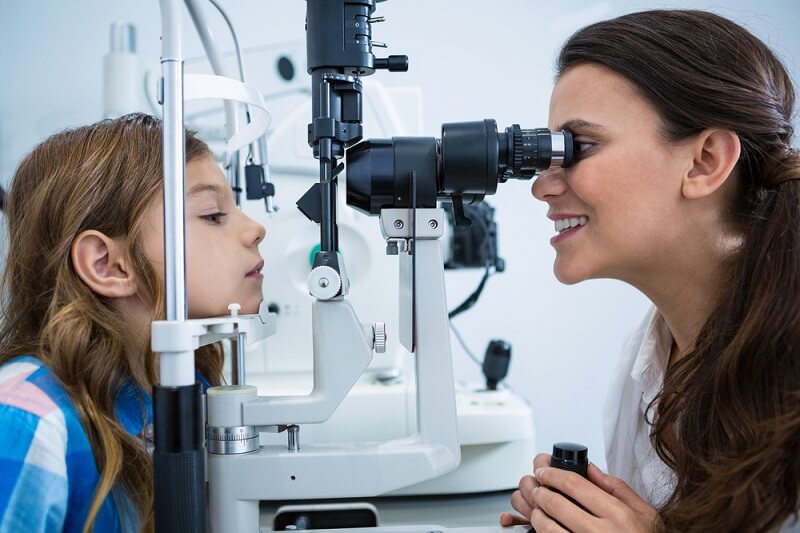
Eye Exams for Children in Guelph
Children’s eye health is a critical aspect of their overall development and well-being. As a parent in Guelph, ensuring your child receives regular eye exams is essential for detecting vision problems early and supporting their educational and social development. This blog provides parents with comprehensive information about children’s eye exams, including what to expect and why they are important.
The Importance of Early Eye Exams
Early eye exams are crucial because many vision problems can develop without obvious symptoms. Children may not realize that their vision is impaired, and untreated issues can affect their learning, behavior, and quality of life. Regular eye exams help detect conditions such as amblyopia (lazy eye), strabismus (crossed eyes), and refractive errors (nearsightedness, farsightedness, and astigmatism) at an early stage, allowing for timely intervention and treatment.
Recommended Eye Exam Schedule
The Canadian Association of Optometrists recommends the following eye exam schedule for children:
- First exam at 6 months old
- Second exam at 3 years old
- Annual exams from age 6 onwards
Following this schedule ensures that any vision problems are identified and addressed early, supporting your child’s visual development and academic success.
Preparing Your Child for an Eye Exam
Preparing your child for their eye exam can help alleviate any anxiety and make the experience more comfortable. Explain to your child what will happen during the exam in simple terms, emphasizing that it is a painless process. Encourage them to ask questions and express any concerns they might have. Bringing a favorite toy or book can also help your child feel more at ease during the appointment.
The Eye Exam Process for Children
During the eye exam, the optometrist will use age-appropriate techniques to assess your child’s vision and eye health. Here’s what to expect:
Visual Acuity Test
For young children, the visual acuity test may involve identifying pictures or shapes instead of letters. This test measures how well your child can see at different distances and helps determine if they need corrective lenses.
Refraction Assessment
The optometrist will perform a refraction assessment to determine the exact prescription for glasses if needed. This may involve using a retinoscope, a device that shines light into the eyes, to observe how it reflects off the retina. For older children, the optometrist may use a phoropter, similar to the one used for adults.
Binocular Vision Test
Assessing binocular vision is essential for ensuring that both eyes work together effectively. The optometrist will check for issues such as strabismus and amblyopia, which can impact depth perception and coordination. Early detection and treatment of these conditions are vital for preventing long-term vision problems.
Eye Health Evaluation
The optometrist will examine the external and internal structures of your child’s eyes to ensure they are healthy. This includes checking the cornea, iris, lens, retina, and optic nerve. For young children, the exam may be adapted to be more engaging and less intimidating.
Addressing Common Vision Problems in Children
If the eye exam reveals any vision problems, the optometrist will discuss the findings with you and recommend appropriate treatments. Common treatments for children’s vision problems include:
Prescription Glasses
Glasses are often prescribed to correct refractive errors and improve visual acuity. Children can choose from a variety of frames designed specifically for young wearers, ensuring both comfort and style.
Patching Therapy
For conditions like amblyopia, patching therapy may be recommended. This involves placing a patch over the stronger eye to encourage the weaker eye to develop better vision.
Vision Therapy
Vision therapy involves a series of exercises designed to improve eye coordination and focusing skills. This treatment is often used for binocular vision problems and other functional vision issues.
Promoting Eye Health at Home
In addition to regular eye exams, parents can support their child’s eye health at home by encouraging healthy habits:
Limit Screen Time
Excessive screen time can cause digital eye strain and negatively impact vision. Encourage your child to take regular breaks from screens and engage in outdoor activities.
Provide a Balanced Diet
A diet rich in fruits, vegetables, and omega-3 fatty acids supports overall eye health. Foods like carrots, spinach, and fish are particularly beneficial for vision.
Ensure Proper Lighting
Ensure that your child has adequate lighting for reading, studying, and other close-up activities. Good lighting reduces eye strain and promotes comfortable vision.
Conclusion
Regular eye exams are essential for detecting and treating vision problems in children, ensuring they have the visual skills needed for academic and social success. By following the recommended eye exam schedule and promoting healthy habits at home, parents in Guelph can support their child’s eye health and overall development. Don’t wait for symptoms to appear—schedule your child’s eye exam today and take a proactive step towards their lifelong vision health.





